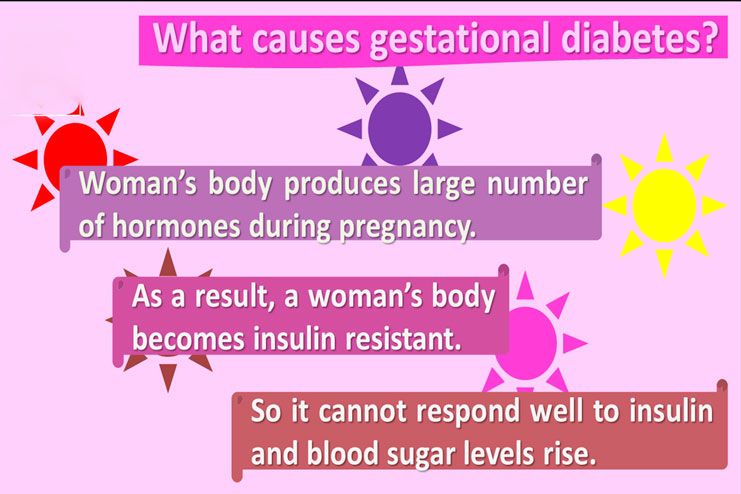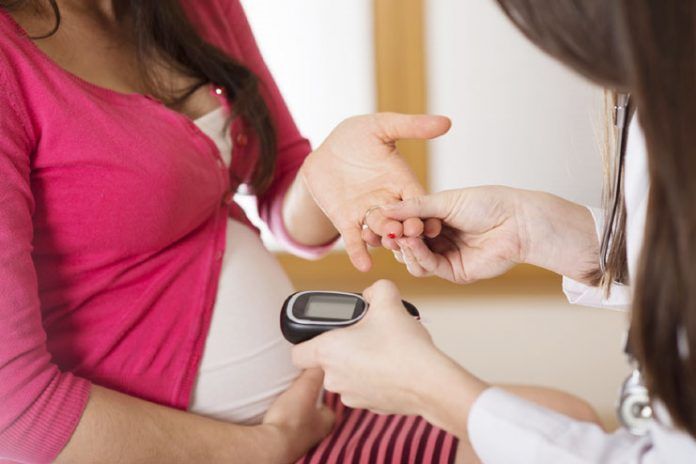Affiliate Disclaimer
Some links in this article are affiliate links. We may earn a small commission if you make a purchase through these links, at no extra cost to you. We only recommend products we find useful to our readersGestational diabetes (GD) is a type of diabetes which develops during the pregnancy, typically in the second or third trimester. While we can’t pinpoint the exact causes of gestational diabetes that triggers high blood sugar between the 22nd and 28th week of pregnancy, it still affects around 10% of all pregnancies.
It occurs when our body cannot produce enough insulin to regulate the blood sugar level, leading to elevated glucose levels. Understanding the causes of gestational diabetes is crucial for expectant mothers, as it can impact both the mother’s and the baby’s health. Identifying the risk factors and causes helps in early detection, better management, and reducing potential complications during pregnancy. Awareness of this condition empowers women to take proactive steps for a healthier pregnancy.
Understanding Gestational Diabetes
A form of diabetes called gestational diabetes usually appears in the second or third trimester of pregnancy. In contrast to the Type 1 and Type 2 diabetes, which are lifelong illnesses, gestational diabetes typically subsides after childbirth. Nonetheless, cautious handling is necessary to prevent problems.
A condition known as gestational diabetes occurs when our body loses sensitivity to the hormone insulin, which controls blood sugar levels. If left untreated, this resistance can result in high blood glucose levels, which can have an impact on both the mother and the unborn child. Women who have gestational diabetes during pregnancy may be more likely to require a cesarean surgery, develop preeclampsia, and give birth to a large baby (macrosomia).
Premature birth, low blood sugar at birth, and the development of Type 2 diabetes or obesity in the future are all risks that the unborn child faces due to gestational diabetes. Understanding and managing this condition is essential for a healthy pregnancy and baby.
What Causes Gestational Diabetes in Pregnant Women:

Hormonal changes which occurs during pregnancy are the leading cause of gestational diabetes in expectant mothers. Insulin resistance can result from the placenta’s production of hormones that aid in the development of the fetus and interfere with the mother’s ability to use insulin. Insulin resistance varies among pregnant women in the latter stages of their pregnancy. While most pregnant women can overcome insulin resistance, some cannot make enough insulin. These ladies get diabetes during pregnancy.
Causes of Gestational Diabetes:
- Hormonal Changes: The effect of insulin is hampered by pregnancy hormones.
- Insulin resistance occurs when the body’s increased need for insulin surpasses its supply.
- Obesity: Carrying extra weight around can worsen insulin resistance.
- Genetics: Women with a family history of diabetes may be at risk.
- Age: Women who are older than 25 are more vulnerable.
- Ethnicity: Gestational diabetes is more common in some ethnic groups, including Asian, African American, and Hispanic.
Symptoms of Gestational Diabetes

Gestational diabetes generally does not have any kind of symptoms, and all of those that occur are the side effects of being pregnant, so it is hard to differentiate between the two symptoms.
Doctors can further diagnose gestational diabetes symptoms like thirst, urination, and hunger pangs through tests conducted between the 22nd and 24th week of pregnancy.
Signs and symptoms are:
- Increased thirst and urination
- Blurred vision
- Constant fatigue
- Frequent infections around the vagina, bladder, and skin
- Nausea and vomiting
- Despite feeling more hungry, there is weight reduction.
If gestational diabetes symptoms are detected early, doctors can start glucose screening tests sooner during pregnancy. Typically, doctors test women for blood glucose levels between the 22nd and 24th week of pregnancy. They conduct a glucose tolerance test for more details if the initial test is positive. Risk of gestational diabetes increases with age and can also be affected by unhealthy lifestyle choices.
Risks and Complications of GD for Mother and Baby
Gestational diabetes increases the risk of preeclampsia or hypertension during pregnancy, labor complications, and cesarean delivery for mothers. A mother may sustain injuries during a vaginal birth if the baby is large (defined as more than 9 pounds at delivery). During delivery, a vast infant could break bones or sustain nerve damage. It might be essential to perform a Cesarean section to deliver the baby.
In addition, there is an increased chance that the child may grow up to have diabetes, obesity, and metabolic issues. Similarly, a mother who has experienced gestational diabetes is more likely to go on to acquire type 2 diabetes in the future.
Managing Gestational Diabetes and Your Diet
You can’t fully control gestational diabetes, but proper treatment reduces risks for both the mother and the baby. Key steps include:
- Following recommended diet and exercise plan.
- Testing blood sugar for at least four times daily.
- Possibly using oral medications.
Promptly addressing any issues is crucial for managing the condition effectively.
Here are some ways to prevent complications from gestational diabetes:
-
Diet Plan
Managing gestational diabetes involves a carefully planned diet. Meet with dietitian to create a personalized meal plan, focusing on eating small, frequent meals. Include a variety of foods, emphasizing high-fiber options like whole grains and reducing carbohydrates and sugary items. Make sure to eat meals and pair lean proteins with carbs. Eat a balanced breakfast and consider alternatives to milk for calcium. Avoid giving in to cravings, as maintaining a strict diet is crucial for managing gestational diabetes. These guidelines can help you manage your blood sugar levels and support a healthy pregnancy.
-
Exercise
Working out is very important for everyone. Especially during pregnancy, you need to be fixed with your daily brisk walk, yoga, and another kegel or vaginal stretching exercise.
-
Monitor the Progress Of Your Baby Regularly
Fetal monitoring helps track the baby’s size and health and allows for timely action. Keep your blood sugar under control and check it regularly.
-
Prescription Drugs
Your OB/GYN might prescribe diabetes medicine or insulin therapy if needed.
When to Seek Medical Help
An uneventful pregnancy depends on the mother’s understanding of when to seek medical attention for gestational diabetes. Look for early symptoms, including increased urine, frequent thirst, and impaired vision. See your healthcare practitioner as soon as possible if you encounter these symptoms. Routine glucose testing is vital to monitor your blood sugar levels and ensure you act quickly if necessary.
Consult an expert for customized management and treatment plans, such as an endocrinologist or nutritionist, if you are diagnosed with gestational diabetes. Effective management of the sickness and reduction of risks for the mother and child is made possible by routine observation and professional counsel. Routine prenatal exams should always come first to monitor your health and catch any early issues.
-
Feb 2018Written by Minu Manisha
-
Oct 2024Edited by Ankita
References
- https://my.clevelandclinic.org/health/diseases/9012-gestational-diabetes
- https://www.yalemedicine.org/conditions/gestational-diabetes-symptoms-causes-treatments
- https://www.mayoclinic.org/diseases-conditions/gestational-diabetes/symptoms-causes/syc-20355339
- https://www.niddk.nih.gov/health-information/diabetes/overview/what-is-diabetes/gestational/symptoms-causes
- https://diabetes.org/about-diabetes/gestational-diabetes
- https://www.marchofdimes.org/find-support/topics/pregnancy/gestational-diabetes
- https://www.ncbi.nlm.nih.gov/books/NBK582729/
- https://diabetes.org/living-with-diabetes/life-stages/gestational-diabetes/how-will-this-impact-my-baby
- https://www.diabetes.org.uk/diabetes-the-basics/gestational-diabetes/complications
In this Article




















